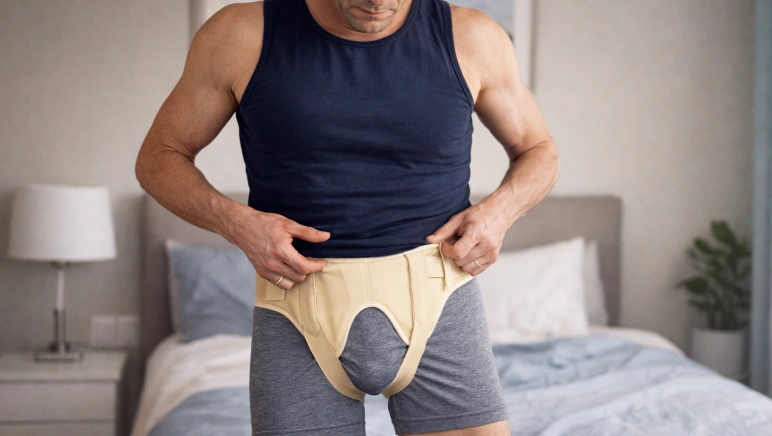
It is natural for hernia repair surgery to bring about a host of questions and concerns, with one of the most common inquiries being whether this procedure could lead to a decrease in stomach size. It's understandable why you might ponder this—after all, any surgical intervention on or around the abdominal area might intuitively seem like it could affect aspects of your digestive system, including the size of your stomach. Below, we address this very question by explaining the realities and misconceptions surrounding hernia repair and its impact on your stomach size.
Understanding Hernia Repair
At its core, hernia repair surgery is designed to correct a hernia - a condition where an organ or fatty tissue squeezes through a weak spot in a surrounding muscle or connective tissue. This surgery is a common procedure, aiming to provide relief and prevent potential complications that hernias might cause. Now, when we talk about hernia repairs, there are primarily two types you might encounter: laparoscopic and open hernia repair.
Laparoscopic hernia repair is a minimally invasive technique. Surgeons make small incisions and use a laparoscope (a thin tube with a camera) to repair the hernia with mesh. This approach generally offers quicker recovery times, less postoperative pain, and a smaller risk of infection.
On the other hand, open hernia repair involves a larger incision directly over the hernia site, through which the surgeon can repair the hernia directly. It's a traditional method that has been perfected over decades. Although it might involve a longer recovery period than the laparoscopic approach, it's still widely used, especially in cases where laparoscopic surgery is not the best option. Both methods aim to reinforce the weakened area, usually with the use of surgical mesh, to provide a strong foundation that minimizes the chance of a hernia recurring.
The Misconception About Stomach Size Changes
First and foremost, it's crucial to clarify that hernia repair surgery does not directly alter the size of your stomach (the organ itself) or significantly change the capacity of your abdominal cavity. The primary goal of hernia repair is to reinforce a weakened area in the abdominal wall and, if necessary, reposition any displaced organs or tissues back to their original locations. This process might lead to a temporary change in the appearance of your abdomen, primarily due to swelling and healing processes, but not to a permanent reduction in your stomach size.
One common source of confusion arises from the physical sensations and dietary adjustments patients may experience post-surgery. After hernia repair, especially during the initial recovery phase, patients might feel fuller sooner than before or may have a reduced appetite. This temporary change is more related to the body's immediate response to surgery and healing rather than any physical reduction in stomach size.
Moreover, the use of surgical mesh in hernia repair, which is a common practice to provide additional support to the weakened area, does not shrink the stomach or abdominal cavity. Instead, it helps prevent the recurrence of a hernia by reinforcing the abdominal wall.
It's also worth noting that lifestyle changes recommended after hernia surgery, such as diet modifications and gradual return to physical activity, are aimed at promoting healing and preventing strain on the repair site. These recommendations might inadvertently lead to a healthier lifestyle, potentially resulting in weight loss or a more toned abdomen for some patients. However, these outcomes are indirect effects of improved lifestyle choices rather than the surgery itself altering the stomach's size.
The Real Effects of Hernia Repair on the Abdomen
For starters, it's common to experience changes in the appearance and sensation of your abdomen immediately following hernia repair surgery. These changes are primarily due to the body's natural healing response. After the surgery, you may notice swelling and bruising around the operated area. This is your body's way of healing the surgical wound and integrating the mesh (if used) into the abdominal wall. Studies have documented these as normal postoperative responses and not indicative of complications.
The surgical mesh, as we mentioned earlier, plays a significant role in the long-term effects on the abdomen. However, it does not alter the anatomy of the abdominal organs, its presence reinforces the abdominal wall, which can lead to a firmer feeling in the abdomen.
Furthermore, the technique used during hernia repair, whether laparoscopic or open, may influence the recovery process and the final appearance of the abdomen. Laparoscopic surgery, known for its minimally invasive approach, generally results in less visible scarring and potentially smoother contours once healed. On the other hand, open surgery may lead to more noticeable scarring but is sometimes necessary based on the hernia's size and location.
Over time, the body adapts to the changes made during hernia repair. The initial swelling subsides, and the scar tissue matures, leading to a more stable and "normal" appearance of the abdomen. However, it's important to note that individual healing processes vary widely. Factors such as age, overall health, the complexity of the hernia, and adherence to postoperative care recommendations significantly impact the recovery and final appearance.
Factors Influencing Abdominal Appearance Post-Surgery
The appearance of your abdomen post-surgery can be influenced by several factors, each playing a crucial role in the final outcome. Below are some of the most common factors that are likely to influence abdominal appearance after your surgery:
- Surgical Technique Used: The choice between laparoscopic and open hernia repair methods significantly influences the appearance of your abdomen after surgery. Laparoscopic surgery is known for smaller incisions, which typically result in less noticeable scarring and potentially a smoother abdominal contour. However, the choice of technique largely depends on the hernia's size, location, and the surgeon’s expertise.
- Quality and Type of Mesh: The type and quality of mesh used during hernia repair also play a vital role in the postoperative appearance. Some meshes are designed to integrate more seamlessly with the body's tissues, potentially leading to a more natural look.
- Patient’s Age and Skin Elasticity: Age and skin elasticity naturally affect how the skin and tissues around the surgical site heal and conform to the changes post-surgery. Younger skin tends to have higher collagen content, which can lead to smoother healing and less noticeable scars. Conversely, older patients or those with less elastic skin might experience more pronounced scarring or differences in skin texture around the incision site.
- Post-operative Care and Lifestyle Choices: How you care for your surgical wound and your lifestyle choices following surgery can significantly impact your recovery and the appearance of your abdomen. Proper wound care, adherence to your surgeon's guidelines, and avoiding activities that strain the abdominal area are crucial for optimal healing. Moreover, a balanced post-surgery diet and regular, gentle exercise (once approved by your healthcare provider) can help maintain a healthy weight and support tissue healing, contributing to a more favorable aesthetic outcome.
- Body Weight and Composition: Changes in body weight and composition before and after surgery can affect the appearance of the abdomen. Weight gain can stretch the skin and tissues, potentially altering the appearance of the surgical site and the surrounding area. Conversely, weight loss can result in excess skin or changes in how the surgical repairs are highlighted.
Managing Expectations and Recovery
To achieve a successful outcome, it is essential to manage your pre and post-surgery expectations and understand how the recovery is going to look for you. For this, you must first understand the recovery timeline.
While individual experiences vary, most patients can expect a gradual return to normal activities. For laparoscopic hernia repairs, patients often experience shorter recovery times and less postoperative pain compared to open surgery. This can mean returning to light activities within days and full activities within a few weeks. However, it's essential to listen to your body and not rush this process. Overexertion can lead to complications and potentially prolong your recovery.
Post-operative pain management is another critical aspect of your recovery. Your healthcare team will provide you with a pain management plan, which may include medications, ice packs, and gentle exercises. Adhering to this plan is key to managing your pain levels and supporting the healing process.
Diet and nutrition also play a significant role in your recovery. A balanced diet rich in vitamins, minerals, and protein can aid in wound healing and muscle repair. Having adequate nutrition post-surgery will significantly impact recovery outcomes by enhancing tissue healing and reducing the risk of complications. Try to incorporate a variety of fruits, vegetables, whole grains, and lean proteins into your diet can support your body's healing needs.
Similarly, engaging in physical activity is essential, but it must be approached with caution. Begin with gentle walks and slowly increase your activity level based on your surgeon's recommendations. Avoid heavy lifting and strenuous exercise until you're cleared to do so.
Lastly, maintain open communication with your healthcare provider. Regular follow-up appointments allow your surgeon to monitor your healing progress, address any concerns, and adjust your recovery plan as needed. Don't hesitate to reach out to your healthcare team with questions or if you notice any signs of complications, such as increased pain, swelling, or infection at the surgical site.
Understanding the realities versus the myths of hernia surgery can empower you to make informed decisions about your care and recovery. At Hernia Innovations, we're committed to providing not just answers to your questions but also the highest quality of hernia services available.
Your well-being is our priority, and our team of specialists is dedicated to offering personalized care tailored to your unique needs. With cutting-edge techniques and a compassionate approach, we ensure that your journey to recovery is smooth, informed, and supported every step of the way.
If you or someone you know is considering hernia repair, remember that you're not alone. We invite you to reach out to Hernia Innovations for a consultation.
Fresh Insights from Leading Hernia Specialists
Stay informed with expert blogs on hernia symptoms, treatment options, prevention strategies, and recovery tips.






.webp)
